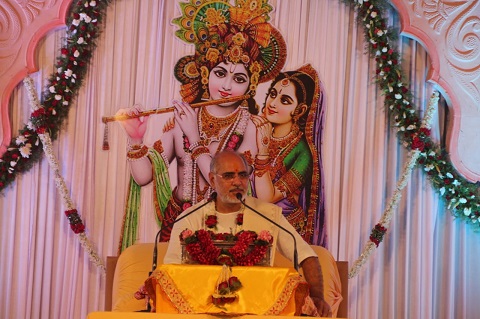On Day 7 Pujya Bhaishri advised us on what we should ask for from God. He also visited the Gurudwara at Hazur Sahib. On day 8, Pujya Bhaishri shares his thoughts on the definition of punya karma (good deeds). What is the purpose of performing good deeds? Is it to attain heaven?
What should we ask for from God? -Days 7 and 8 Nanded Katha Summaries
Day 7 – Let us learn how to beseech from God
Not only is asking for God devotion (bhakti), but asking from God can also become devotion. The condition is that we can learn and understand what to ask for.
The truth is that one who has learnt how to ask has become a great devotee. Prahladji asked from God, “O God! I ask from you that may my desire to ask for anything diminish.”
Mother Kunti asked from God, “O God! grant me difficult times repeatedly so that I continuously remember you.”
King Pruthu asked from God, “O God! give me ten thousand ears so that I can hear as many lilas (pastimes) of yours”.
In addition, Sugrivji asked for something amazing, “God, grace me so that I can renounce everything and pray morning and night”.
It is not wrong to beseech from God but be conscious of what you ask for. The outcome of listening to Katha is that one learns what to ask for from God.

On day 7 of the Katha, Pujya Bhaishri visited the Gurudwara Hazur Sahib at Nanded. Watch Pujya Bhaishri’s visit and speech.
Day 8 – Definition of good deeds
Good deeds does not only mean those actions which benefit you, but also, those actions which lead to the well-being of others. The purpose of performing good deeds is not just to attain heaven after death, but to make life like heaven.
It is not wrong to perform good deeds to reach heaven, but it is better to perform good deeds for the welfare of others. Any action performed with a good intention is a good deed and any action performed with a bad intention is a sin.
Those actions loved by God are good deeds. Our actions and behaviour must not be the cause of pain and anguish for others. Our life should be a solution for others, not a difficulty.
This is the true definition of punya karma (good deeds) and parmartha (benevolence). Hence, there can be no greater spiritual practice than performing your duties sincerely. That spiritual practice which is done to avoid one’s duties cannot be said to be ideal.


It is not a big deal to leave home and sit in a cave for spiritual practice, but it is a big deal to continue performing our duties whilst living in a household. It was due to fulfilling their duties that Lord Ram left Ayodhya and Lord Krishna left Vrindavan. It is ok to leave home for our duties and not vice versa.
If people like Shabri, Kevat and Nishad will be dedicated in fulfilling their duties, then Lord Ram will be compelled to leave Ayodhya and go to the forest to give them darshan.
With these enlightening messages, Nanded Katha concluded on 16 May 2019 in which thousands attended daily and listened with devotion.